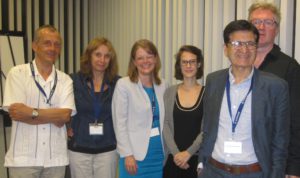On September 2nd 2017 research associate Dr. Marie Favereau took part in the Vth European Congress on World and Global History (ENIUGH) in Budapest. Her panel, entitled ‘Empires, exchange and civilizational connectivity in Eurasia’, was organized by Chris Hann (Max Planck Institute for Social Anthropology Halle; PI of the ERC-funded project “Realising Eurasia”).

In Hann’s own words “the baseline for this panel is a turning point in world history: the urban revolution of the Bronze Age, as outlined by anthropologist Jack Goody (1919 – 2015), following archaeologist Gordon Childe. This revolution launched multiple civilizations of Eurasia on unprecedented paths of development that culminated in industrial capitalism (…) Empirically, the papers analyse various societies and empires, their immaterial as well as their material constitution, and the concrete ways in which they fertilized each other in pan-Eurasian encounters.”
Dr. Favereau’s presented a paper in which she discussed the concept of “Mongol Peace”. She showed how in the 1260s the Mongols transformed their old empire into a kind of commonwealth; how they changed the rules of exchange in Eurasia; and how actually their “peace” meant a new global economic order.